Search Results
Showing results 1 to 20 of 22

Super Shrinkers
Source Institutions
In this activity on page 14 of the PDF (Rethinking the 3 R’s: It’s Easy to be Green), learners turn plain pieces of recycled plastic into shrunken works of art.

Clay Exploration
Source Institutions
In this activity, learners explore the possibilities of clay as a natural material.
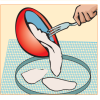
Making Recycled Paper
Source Institutions
In this activity on page 11 of the PDF, learners follow simple steps to recycle old newspaper into new paper.
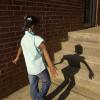
Exploring Shadows
Source Institutions
This activity guide features three related explorations to help learners ages 3-6 investigate shadows via the following science concepts: A shadow is made when an object blocks the light; you can chan
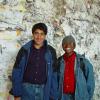
Recycle Your Own Paper!
Source Institutions
In this activity (page 2 of PDF under GPS: Garbology Activity), learners will prepare sheets of homemade recycled paper from several different source pulps.
Disappearing Water
Source Institutions
In this outdoor water activity, learners explore evaporation by painting with water and tracing puddles. Learners will discover that wet things become dry as the water evaporates.
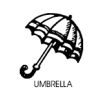
If Anyone Can, Icon
Source Institutions
In this activity, learners create their own icons for a forecast-at-a-glance poster for their classroom/learning space.
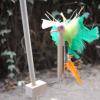
Woodpecker
Source Institutions
In this activity, learners construct a traditional handicraft toy that illustrates a motion commonly associated with violins and earthquakes.
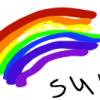
Light is Made of Colors
Source Institutions
Learners observe different light sources, outdoors and indoors, using prism glasses (diffraction glasses) and color filters.
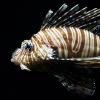
Fishy Observations
Source Institutions
In this activity (page 1 of the PDF under SciGirls Activity: Rabbits), learners will visit a zoo, aquarium, or pet store to view a variety of fish.
Leaves: Extracting Pigments
Source Institutions
In this fun, hands-on autumn activity, learners experiment to discover whether the colored substances in leaves can be separated from the leaves.
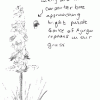
Nature Drawing
Source Institutions
In this family or group activity, learners create a nature journal by visiting a local nature center or backyard, observing creatures in their natural habitats, and sketching what they see.
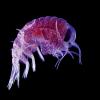
Plankton Races
Source Institutions
In this two-part activity, learners investigate buoyancy, density and surface area as well as biodiversity and the relationship between the structure and function of organisms.

The Carbon Cycle and its Role in Climate Change: Activity 3
Source Institutions
In this activity, learners explore the human influences on the carbon cycle and examine how fossil fuels release carbon.
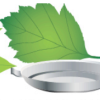
Paper Chromatography with Leaves
Source Institutions
In this activity on page 5 of the PDF (Plants—The Green Machines), learners use chromatography to separate and identify pigments within various leaves.
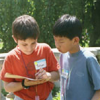
Colors in Nature
Source Institutions
In this activity, learners create colorful bead bracelets to wear outside while searching for matching colors in plants. Learners will be surprised by the variety of colors in nature.
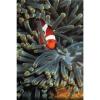
Underwater Hide and Seek
Source Institutions
In this activity, learners experience firsthand how marine animals' adaptive coloration camouflages them from prey.
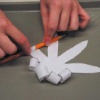
Moving On Up: Capillary Action II
Source Institutions
Learners explore capillary action in plants (such as plants ability to move water from roots to leaves) in an investigation called Paper Blooms.

Environmental Chemistry
Source Institutions
In this activity with several mini experiments, learners explore the chemistry that helps scientists learn about the environment and how they can help save it.
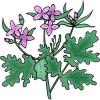
Photosynthetic Pictures Are Worth More Than a Thousand Words
Source Institutions
This activity provides an opportunity for learners to observe and examine how carbon dioxide, water, and light produce glucose/starch through a process called photosynthesis.
